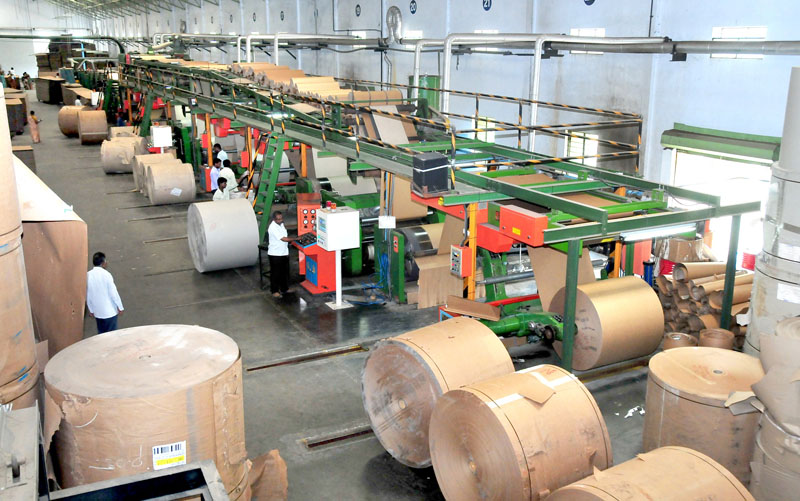Fanning out

The Indian group of companies that includes Chaitanya Packaging now also supplies rotary dies for use on packaging and converting machines.
By George Gay
As I traveled with T.R. Prabhu, the chairman of a group of companies that includes Chaitanya Packaging, between some of his factories and godowns on the outskirts of Guntur, India, he made the point that somebody had to provide meaningful employment for the people who lived in the numerous and populous villages we were passing through.
He made his comment after I had expressed curiosity about the rate of increase in the number and diversity of the businesses that made up his group. Prabhu had just mentioned that he was about to start a company that would build machinery, and I knew that the print was hardly dry on the business cards for his Diehard Dies Pvt. Ltd. enterprise.
The group’s flagship business is the 19-year-old Tulasi Seeds, which produces vegetable seeds, with emphasis on chilies, and hybrid cotton seeds in a process that incorporates technology licensed from Monsanto. “We are the third-largest cotton seed company in India,” said Prabhu. “It’s all sold in India at the moment, but we are looking for opportunities to go to Africa.”
Surprisingly for a man who controls a number of diverse businesses, Prabhu talks with expertise and in detail about each of them, almost as if he is in daily control of them all. And he speaks and acts with precision, often repeating what he has said in different ways to ensure the meaning is clear.
Another of his enterprises cultivates about 400 acres of land with vegetables and fruit, especially lemons and mangoes.
And, as is mentioned above, his new venture is Diehard Dies, which he started to put in place in November 2009. This company uses machinery imported from Germany and raw materials imported from Europe to produce flat and rotary dies for use on converting and packaging machines for folding cartons and corrugated boxes. Diehard Dies, Prabhu explained, was the first company in India to make such rotary dies.
“In addition, we make flexible steel label-cutting dies, and we are the first company in Southeast Asia to do that,” he said. “This is a 100 percent export business.
“Making flexible dies is a very difficult manufacturing process that requires a high degree of precision. The labeling industry is very automated and needs sophisticated dies. No other company in the Middle East or Africa can produce such dies, so my target comprises customers in all of the countries of these regions—50-60 companies in South Africa alone.”
Diehard Dies offers also embossing blocks, gold-finishing bocks and Braille embossing dies in a range of materials including brass, copper and magnesium.
Meanwhile, the group includes a company that manufactures stationery under the Tulasi brand name and what Prabhu describes as a “small” software company based in Hyderabad.
Packaging
But the number-two company in the group, measured in turnover, and the company of most interest to the tobacco industry, is Chaitanya Packaging, 65 percent of whose output is bought by tobacco companies.
Chaitanya, which produces C48 cases under the Power-400 brand name, supplies 75 percent of India’s demand for these 200 kg cases, and exports them to Bangladesh, Dubai (for cut rag), Malawi, the Philippines, Tanzania and Turkey.
Chaitanya started its C48-case exporting business with sales to Bangladesh about six years ago, and by last year some 40 percent of its output was destined for sale overseas. And perhaps that figure has increased by now. When I spoke with Prabhu, he was in discussions about possible export sales to Indonesia, Malaysia, Thailand and Zimbabwe.
So was Chaitanya successful, I asked? “Yes,” was Prabhu’s short answer.
And why was that? “We are continuously upgrading the box making machinery we use, which is imported from Taiwan,” he replied. “We are continuously modernizing so as to increase productivity and quality. Chaitanya is an ISO9001:2008 certified company.”
And what about the group as a whole; was that successful too? “Highly successful because of continuous R&D to improve productivity and quality,” he said.
Overall, the group’s annual turnover is about INR3 billion ($65 million). And that figure is expected to reach $100 million within about two years.
As well as having a big turnover, the group is highly profitable, according to Prabhu, but at the moment this level of profitability is largely down to the seeds business. The packaging business was not particularly profitable because it competed in a very competitive marketplace and margins were thin, he said.
Finally, I asked Prabhu how he saw the future of the tobacco industry as it related to his packaging business.
“From what I see the tobacco industry will be doing about the same acreage in the next 10 years,” he said. “It may not grow overall, though I think it will grow year on year in India. So I foresee good business for Chaitanya Packaging. My target is to grow its sales turnover by at least 50 percent during the next two or three years. We can do it—with more competitive prices and better qualities.”
That’s good news for Chaitanya, good news for the group and good news for locals looking for employment.
